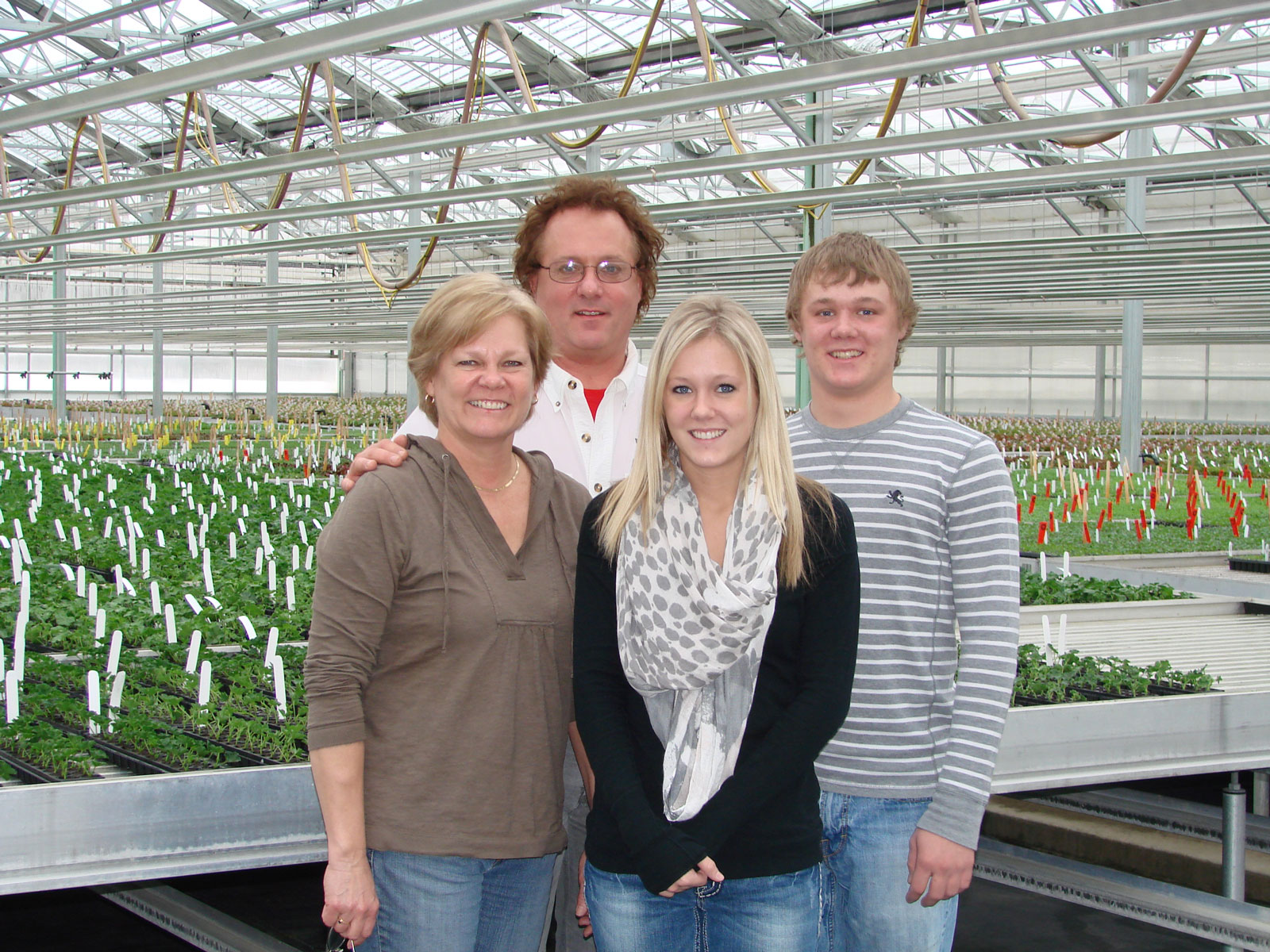
For Plantpeddlers Entrepreneurship Runs In The Family
For Mike and Rachel Gooder “value added” has been second nature for more than 30 years.
The owners of Plantpeddler in Cresco, Iowa, purchased the greenhouse just a month after Mike (’80 horticulture) graduated from Iowa State University and a few days after they exchanged wedding vows. It didn’t take them long to start adding value and addressing new markets in wholesale. They added a new division to their local greenhouse, Plantpeddler Wholesale, providing weekly truck service to a regional market.
“We realized pretty early on that we’d have to keep diversifying our business and looking for new opportunities to add value to what we were producing,” says Rachel.
By 2000, Plantpeddler had gone global. Rachel (’79 horticulture) and Mike partnered with Dummen, a German company, to produce Hiemalis Begonias for the North American market. Through that initial partnership, another division was added. Plantpeddler Young Plants imports cuttings from around the world for value-added processing by rooting and starting them prior to shipping to other greenhouses and markets throughout the United States. The young-plant production and distribution happens year-round at the facilities, serving more than 2,500 customers worldwide.
The addition of the different divisions allowed the staff to grow to 12 full-time, 22 part-time and 12 seasonal employees, making it a significant employer in Howard County.
Within recent years, the Gooders found renewed energy and enthusiasm in the production of local foods in their greenhouse.
“A few years ago, we had a startling revelation,” says Mike. “Iowa, for all its wonderful corn and soybean production, is a net importer of food products. That’s not right.”
To the Gooders, it was clear Iowa needed more local food production. They researched varieties and learned a lot about greenhouse production.
“The idea is not only to produce local food for the area, but to balance the seasonality of the product lines and divisions we have here,” says Rachel. “We have established relationships with our outlets. We can both benefit through our providing them a food product in addition to the ornamental lines.”
Plantpeddler replaced 30,000 poinsettia plants with a trial of three acres of vegetables to determine the best varieties for greenhouse production. The operation began marketing under the name Stone Creek Farms. “We decided to focus on lettuce, tomatoes and cucumbers,” says Rachel. The produce fills the greenhouse during slower months, keeping staff employed and facilities utilized, adding overall value to the operation.
“Mike and Rachel Gooder are marketers,” says Ray Hansen, director of ISU Extension’s Value Added Agriculture Program. “They know that just the desire to produce local food is not enough. There has to be a market for it and one at which they can make a profit.”
Hansen has worked with the Gooder family through the Iowa Fruit and Vegetable Working Group, which Mike is active in.
Mike also assists with several horticulture committees at Iowa State, providing insight on the industry. He has had an advisory role in the recent construction of the greenhouses on campus. The Gooders also offer internships for Iowa State students at Plantpeddler.
In addition, Mike and Rachel are active in the Northeast Iowa Food and Fitness Initiative, working to bring local foods to communities.
Next generation of Gooders carry on startup spirit
Gooder’s son John is a sophomore at Iowa State majoring in horticulture. He helped make the recent transition from poinsettias to produce. “It was a lot of trial and error,” John says. “We learned a lot the first three years.” John plans to work for PlantPeddler this summer and eventually join the family business.
Daughter Abby, a senior in agricultural business at Iowa State, has embraced value-added agriculture, too. Last year she led a team in the Ag Innovation and mValue Creation Competition sponsored mby the college’s Agricultural Entrepreneurship mInitiative. Abby’s product uses corncobs for horticultural purposes. Her team placed first in the competition.
“I was pleased to win the contest,” says Gooder, “but the really exciting part was the encouragement from the panelists afterward. They told me that if our calculations and market estimates were accurate, then I should be really excited about pursuing the opportunity.”
A summer internship at Creative Composites in Ankeny solidified Abby’s desire to turn her concept into a reality. The biocomposite industry is assisting Abby in research and development of the product, and the Agricultural Entrepreneurship Initiative is helping Abby develop a formal business plan.
Given the value already added to their operation, it’s no wonder the Gooders hope for a bright future in local foods. “We like the idea of supporting the local foods movement and getting young people involved in gardening and their health,” says Rachel. “Naturally, we’d like to help our own children to grow and transition into the business, as well.”



